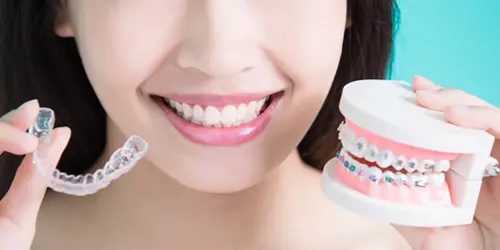When you search for a new dentist online, you will always find a significant distinction. You would discover dentists, orthodontists, periodontists, prosthodontists, and implant specialists. Unlike 20 years ago, when a single dentist could do pretty much all the procedures – with a few exceptions, of course – modern dentistry is all about specialization.

It makes excellent sense for a dental operator, like PCO Pediatric and Orthodontics, to become a specialist. A specialist is more focused and dedicated to a specific branch of dentistry, so all of their energy goes into advancing that particular skill.
But what does that mean for you, the patient? Where should you go? What’s the difference between a dentist and an orthodontist? We’ll attempt to simplify that somewhat overwhelming choice.
How Does Someone Become A Dental Specialist?
The road to becoming a dentist is a long and grueling one, but it is also a very satisfying one. Typically, a person needs about 4 years of undergraduate studies, followed by another 4 years of dental school. At this point, the dentist would become certified as a general practitioner and is licensed to practice procedures such as fillings, root canals.. etc.
Obtaining a specialized certificate requires even more work and dedication. Most dental specialty programs range between 3 and 4 years. According to the chosen branch, the general dentist becomes a specialist.
What Are The Most Common Specialties?
1. General dentists:
These dentists didn’t go through a specialization program and are satisfied – and highly skilled – in filling, root canals, simple extractions, and teeth cleaning, among others.
2. Orthodontists:
An orthodontist is someone who went through an orthodontics specialization program. After which, he can deal with braces and your teeth arrangement and smile in general.
3. Periodontists:
Also known as “gum dentists,” which is way more than it seems. Dealing with the gums is very delicate and requires a highly trained professional.
4. Prosthodontists:
Prosthodontists mainly deal with artificial teeth. If you lost a tooth or a number of teeth, then a prosthodontist should be the one who gives you all the options to replace them.
5. Pediatric dentists:
Dealing with children –especially in the dental field – takes a special person. Someone who is not only patient but absolutely dedicated to their craft to make a dental visit for children, not something to fear, but something to look forward to.
6. Oral surgeons:
A little more bloody but a lot more delicate. Oral surgeons deal with bone fractures, jaw surgeries, pathology removal, dental implants, and a lot more highly delicate surgeries.
Now let’s focus on the task at hand, the most asked question, the difference between a dentist and an orthodontist.
What’s The Difference Between A Dentist And An Orthodontist in New York?
You probably guessed it by now. An orthodontist is also a dentist, but one who has chosen to take more years in practicing what he\she loves orthodontics. Orthodontics is the art and science of teeth arrangement, known commonly as braces.
To become an orthodontist, a dentist would have to go through 3 more years of an accredited specialty program, after which he\she would be certified to practice orthodontics. So basically, to become an orthodontist, a person would need around 11 years of training and studies. That alone shows you how much an orthodontist has gone through to reach his status and how dedicated they are to their profession.
Can A Dentist Do Orthodontics?
Legally, nothing is stopping a dentist from performing all kinds of procedures, braces included. A dentist could take an accredited course or training with a skilled orthodontist and start treating cases on his\her own.
However, that very rarely happens. Most dentists focus more on fillings and root canals and leave the braces to orthodontists.
Is An Orthodontist More Qualified Than A Dentist?
Not to take anything away from dentists, but yes, an orthodontist is more qualified in Orthodontics. Throughout their training, orthodontists see and treat a wide variety of cases, and therefore they become well-versed in the field of orthodontics and are more capable of handling your case than a dentist.
Not only that, but orthodontists do just that, orthodontics, and only orthodontics. They don’t usually treat general cases as fillings and extractions, so all their focus is poured into braces. That focus and dedication makes an orthodontist the obvious choice for patients needing braces.
What Kind Of Cases Can An Orthodontist Treat?
Another difference between a dentist and an orthodontist is how to spot and pan for a problem dealing with teeth arrangement. These include:
- Crowded teeth: When there is no space for teeth to be properly arranged, they end up crowded and out of place.
- Gapped teeth: The opposite of crowding. The jaw is too large for the teeth and so they end up far-set from each other.
- Overbite: Normally, the upper front teeth cover about ½ the outer surface of the lower front teeth. When they are longer, covering about 2/3 (and in some cases the entire length of the lower teeth) it is known as an overbite or a deep bite.
- Underbite: The opposite of an overbite. When the upper and lower front teeth do not meet, even when the back teeth are well in contact.
- Jaw size mismatch: One of the cases that need very careful planning and excellent teamwork. A dentist, a surgeon, an orthodontist, and a prosthodontist must all work together to determine the best treatment outcome when the patient’s jaw sizes are out of order. This means the upper jaw is too large or the lower jaw is too small .. etc.
Knowing All That, Who Should I Go To Now?
To ensure you receive the appropriate care, it is important to understand the distinctions among dental specialists. While determining the right professional may not always be your responsibility, visiting your dentist regularly every six months allows them to identify any issues and guide you to the appropriate specialist if necessary. Trust in the expertise of our team at PCO Pediatric and Orthodontics to recognize your needs and support you throughout your treatment journey. For further assistance, please don’t hesitate to contact us.


